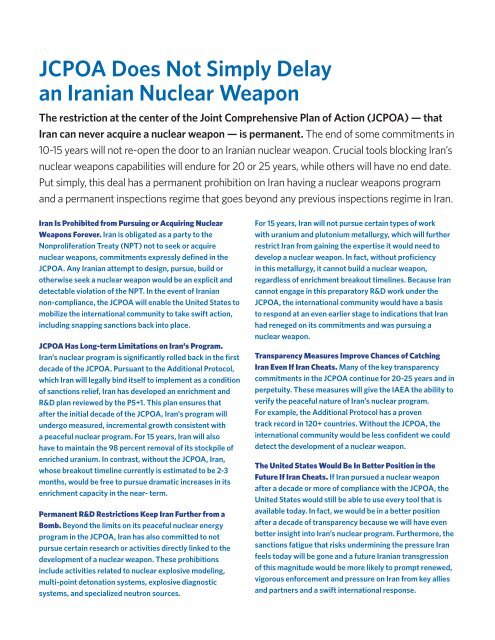WHAT YOU NEED TO KNOW ABOUT THE JCPOA
jcpoa_what_you_need_to_know
jcpoa_what_you_need_to_know
- No tags were found...
You also want an ePaper? Increase the reach of your titles
YUMPU automatically turns print PDFs into web optimized ePapers that Google loves.
<strong>JCPOA</strong> Does Not Simply Delayan Iranian Nuclear WeaponThe restriction at the center of the Joint Comprehensive Plan of Action (<strong>JCPOA</strong>) — thatIran can never acquire a nuclear weapon — is permanent. The end of some commitments in10-15 years will not re-open the door to an Iranian nuclear weapon. Crucial tools blocking Iran’snuclear weapons capabilities will endure for 20 or 25 years, while others will have no end date.Put simply, this deal has a permanent prohibition on Iran having a nuclear weapons programand a permanent inspections regime that goes beyond any previous inspections regime in Iran.Iran Is Prohibited from Pursuing or Acquiring NuclearWeapons Forever. Iran is obligated as a party to theNonproliferation Treaty (NPT) not to seek or acquirenuclear weapons, commitments expressly defined in the<strong>JCPOA</strong>. Any Iranian attempt to design, pursue, build orotherwise seek a nuclear weapon would be an explicit anddetectable violation of the NPT. In the event of Iraniannon-compliance, the <strong>JCPOA</strong> will enable the United States tomobilize the international community to take swift action,including snapping sanctions back into place.<strong>JCPOA</strong> Has Long-term Limitations on Iran’s Program.Iran’s nuclear program is significantly rolled back in the firstdecade of the <strong>JCPOA</strong>. Pursuant to the Additional Protocol,which Iran will legally bind itself to implement as a conditionof sanctions relief, Iran has developed an enrichment andR&D plan reviewed by the P5+1. This plan ensures thatafter the initial decade of the <strong>JCPOA</strong>, Iran’s program willundergo measured, incremental growth consistent witha peaceful nuclear program. For 15 years, Iran will alsohave to maintain the 98 percent removal of its stockpile ofenriched uranium. In contrast, without the <strong>JCPOA</strong>, Iran,whose breakout timeline currently is estimated to be 2-3months, would be free to pursue dramatic increases in itsenrichment capacity in the near- term.Permanent R&D Restrictions Keep Iran Further from aBomb. Beyond the limits on its peaceful nuclear energyprogram in the <strong>JCPOA</strong>, Iran has also committed to notpursue certain research or activities directly linked to thedevelopment of a nuclear weapon. These prohibitionsinclude activities related to nuclear explosive modeling,multi-point detonation systems, explosive diagnosticsystems, and specialized neutron sources.For 15 years, Iran will not pursue certain types of workwith uranium and plutonium metallurgy, which will furtherrestrict Iran from gaining the expertise it would need todevelop a nuclear weapon. In fact, without proficiencyin this metallurgy, it cannot build a nuclear weapon,regardless of enrichment breakout timelines. Because Irancannot engage in this preparatory R&D work under the<strong>JCPOA</strong>, the international community would have a basisto respond at an even earlier stage to indications that Iranhad reneged on its commitments and was pursuing anuclear weapon.Transparency Measures Improve Chances of CatchingIran Even If Iran Cheats. Many of the key transparencycommitments in the <strong>JCPOA</strong> continue for 20-25 years and inperpetuity. These measures will give the IAEA the ability toverify the peaceful nature of Iran’s nuclear program.For example, the Additional Protocol has a proventrack record in 120+ countries. Without the <strong>JCPOA</strong>, theinternational community would be less confident we coulddetect the development of a nuclear weapon.The United States Would Be In Better Position in theFuture If Iran Cheats. If Iran pursued a nuclear weaponafter a decade or more of compliance with the <strong>JCPOA</strong>, theUnited States would still be able to use every tool that isavailable today. In fact, we would be in a better positionafter a decade of transparency because we will have evenbetter insight into Iran’s nuclear program. Furthermore, thesanctions fatigue that risks undermining the pressure Iranfeels today will be gone and a future Iranian transgressionof this magnitude would be more likely to prompt renewed,vigorous enforcement and pressure on Iran from key alliesand partners and a swift international response.


